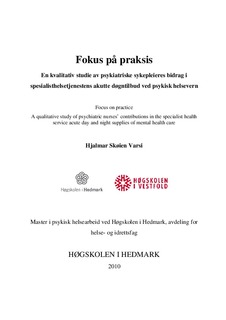Fokus på praksis : En kvalitativ studie av psykiatriske sykepleieres bidrag i spesialhelsetjenestens akutte døgntilbud ved psykisk helsevern
Master thesis
Permanent lenke
http://hdl.handle.net/11250/132528Utgivelsesdato
2010Metadata
Vis full innførselSammendrag
Stadige omstillinger innenfor psykisk helsearbeid og helsevern ligger som bakgrunn for studien. Organiseringen har endret seg og en ser i stortingsmeldingene fra staten at samordning, samhandling og tverrfaglighet har fått styrket sin plass. Samtidig gir forskning et inntrykk av at arbeidet ved de akuttpsykiatriske døgntilbudene innehar et akutt og uforutsigbart preg som kan gi følger for behandlingen. Virksomheten og reorganiseringene stiller store krav til psykiatriske sykepleiere og muligheten til å bevare en meningsfull profesjonell identitet. Hensikten med studien er å belyse hva psykiatriske sykepleiere beskriver som sitt bidrag i det tverrfaglige arbeidet ved det akuttpsykiatriske døgntilbudet. Jeg ønsker økt kunnskap og innsikt i deres kliniske arbeid i en tid som preges av omstillinger.
Åtte psykiatriske sykepleiere har deltatt i forskningsintervju. Det ble brukt en semistrukturert intervjuguide og materialet ble analysert etter prinsipper fra den kvalitative innholdsanalyse. Studien er inspirert av en hermeneutisk-fenomenologisk tilnærming med vekt på en deskriptiv design.
Samtlige gav et inntrykk av at hverdagen var travel og at eget arbeid bestod av mange og varierte oppgaver. Det kom frem en opplevelse av å være allsidig ved at en kunne bidra med både praktiske gjøremål og oppgaver med større og mindre faglig relevans. Eget bidrag oppleves av flere som utydelig og det virker som det er vanskelig å synliggjøre sin profesjon i det tverrfaglige arbeidet. Noen stiller seg kritiske til innholdet i det samlede arbeidet ved institusjonen. Samlet sett synes det pasientnære arbeidet å være det som oppleves som spennende og faglig utfordrende. En har mulighet til å tilbringe mye tid sammen med pasient og dermed bidra med mengder av observasjoner som tenkes vil kunne være nyttig for det samlede pasientarbeidet. En motsetning synes å være en opplevelse av økende avstand til pasient ved at en pådro seg arbeid av mer administrativ karakter. Flere hadde ofte rollen som ”vaktansvarlig” som innebar at en ikke hadde direkte pasientkontakt. Summary:
Continuously restructuring of mental health care and health care is the background for the study. The organization has changed and one can see in the White reports from the state that coordination, collaboration and interdisciplinary have strengthened their position. At the same time research lead to the impressions that the work of the emergency psychiatric day and night supplies possess an acute and unpredictable character that can provide implications for treatment. Activities and the reorganizations require significant demands to psychiatric nurses, and the opportunity to preserve a meaningful professional identity. The purpose of this study is to clarify on what psychiatric nurses describe as their contribution to the interdisciplinary work of the acute psychiatric day and night supplies. I want more knowledge and enlightens into their clinical work in an era marked by restructuring.
Eight psychiatric nurses participated in the research interview. It was used a semi-structured interview guide and the material was analyzed according to the principles of the qualitative content analysis. The program is inspired by a hermeneutic-phenomenological approach with emphasis on a descriptive design.
All gave the impression that their workdays were busy and that their own work consisted of many and varied tasks. More experienced to be versatile in helping with practical tasks, and assignments with major and minor academic relevance. Some find that their own contribution seems unclear and that it was difficult to visualize their profession in the interdisciplinary work and some were very critical to the content of the overall work of the institution. Overall, it seems patient-centered efforts to be what is perceived as exciting and academically challenging. One has to spend much time with the patient and thereby provide a lot of observations that conceivably could be useful for the overall patient work. A contradiction seems to be an experience of increasing distance from the patient by a sustained work of a more administrative nature. More often had the nurses’ role as "duty manager" which meant that they did not have direct patient contact. The analysis shows consistent and clear outstanding experience but also the variety and some personal experiences.
